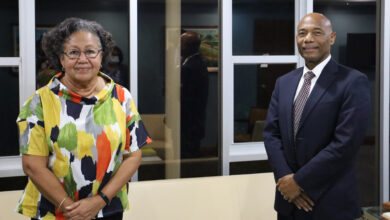BRIDGETOWN, Barbados, CMC – The economies of Caribbean countries are in a “recovery mode” even though it is still operating in a “somewhat topsy-turvy external environment,” the president of the Barbados-based Caribbean Development Bank (CDB), Dr. William Warren Smith said Wednesday.
Delivering the annual report on the current state of Caribbean economies, Smith said though he remains “guardedly optimistic about 2016.
“Economic recovery remains fragile; but we expect that the countries will continue on an upward trajectory.”
Via CMC
But he noted “two of our stronger credits, Trinidad and Tobago and Suriname, will experience negative growth in 2016.
“Interestingly, all the services-dependent economies should grow, even if very marginally. This is a rebound from earlier years after the Great Recession. The two BMCs whose economies are expected to contract are heavily commodity dependent and also represent a reversal of a trend which had emerged a few years ago,” he added.
Smith said as a result “one could conclude that Caribbean economies are in recovery mode and that would be a fair comment, except that it is occurring at a time of great uncertainty in what is emerging as a somewhat topsy-turvy external environment.
“These external threats include the possibility of economic weakening in Europe and North America at the same time that China’s growth rate is slowing as it addresses internal structural weaknesses.”
He said that threats also loom ominously in the shape of the correspondent bank de-risking crisis, which portends challenges for the movement of money into and out of Caribbean economies.
Last week, Caribbean Community (CARICOM) leaders who met in Belize said they had agreed to appoint a high-level advocacy group headed by Antigua and Barbuda Prime Minister Gaston Browne to tackle the corresponding banking fallout.
“This group will be charged with the responsibility to represent the interest of the region in addressing this issue, including an approach to the United Nations and the World Trade Organization,” said CARICOM chairman Dean Barrow.
“We are also talking about engaging directly with the regulators, particularly in the United States, and with the US Congress. We will meet with as many Congress leaders as the team will be able to interface with,” he said.
The CARICOM leaders said several international banks, mainly in the United States and Europe, have signalled to client banks in the region an unwillingness to continue doing business with them.
The so-called ‘de-risking’ by the global banks threatens to impact several critical services, including remittance transfers, and Prime Minister Barrow said that a letter, which he would sign, will also be sent to US President Barack Obama on the issue.
The CDB president said that in addition to these is the ever present threat to economic and social infrastructure posed by natural hazards and climate change.
He said that in the face of a surfeit of threats to economic stability and growth, it is not surprising, therefore, that the term “sustainable” is “almost de rigeur in describing the menu of actions which need to be taken in managing Caribbean economies”.
Smith told reporters that the CDB had been able to assist its BMC’s withstand or build resilience to the myriad of threats through a wide range of products “which an institution like ours can deploy in support of a country’s efforts to build a more resilient and sustainable economic and social system.
“The judicious use of technical assistance, grants, capital and policy-based loans blended with our staff’s many years of experience working in Small Island Developing States (SIDS) enables CDB to partner with its BMCs to build resilience against a raft of different risks.”
He said last year, the region’s premier financial institution, approved 12 capital loans, three policy-based loans (PBLs) and 62 technical assistance (TA) interventions, totalling US$292 million, up from
US$270 million in 2014.
He said loans totaling US$262 million were made to 10 countries, the largest beneficiaries being Antigua and Barbuda, Belize and Grenada.
Smith said that CDB’s operations in 2015 were directed towards long-term inclusive and sustainable growth; good governance and resilience building.
“The bulk of the financing was targeted at investments to strengthen and modernise social and economic infrastructure; to improve environmental management and disaster risk management (DRM); to build climate resilience while promoting energy efficiency (EE), and renewable energy (RE); and to encourage private sector development and improvements in governance.”
The Jamaican-born CDB head said that infrastructure development plays an important role in enhancing the business environment, increasing access to employment opportunities and reducing poverty.
He said in the area of economic infrastructure, the bank approved seven loans totaling US$121 million or 46 per cent of total approvals that included improving water supply in the Bahamas and Barbados; upgrading the John Compton Dam in St. Lucia; flood mitigation in Barbados; and rehabilitation and reconstruction of roads and sea defenses after damage from floods and Tropical Storm Erika in Dominica.
He said four major interventions totaling US$65mn were made to upgrade social infrastructure, and included TechVoc Education and Training in St. Kitts and Nevis; two basic education projects in Belize and Grenada; and one project to enhance the effectiveness and sustainability of the Student Revolving Loan Fund in Barbados.
He said Haiti also received a grant of almost US$13 million from CDB for TechVoc Education and Training.
Smith said that the approved projects included components that provided for gender assessments; gender training and improvements in other support systems for at-risk and vulnerable groups; social and gender monitoring and evaluation; climate risk and vulnerability assessments; and photovoltaic potential assessments.
“These recurring themes are consistent with ongoing efforts to mainstream gender; climate resilience and disaster risk management; and energy considerations in project design. The water upgrade project in Barbados, for example, makes provision for an assessment of the gender-related impacts of frequent water outages in the most affected areas of Barbados.
“Also, renewable energy capacity will be expanded via the installation of a 550 kW solar photovoltaic plant under the Bahamas’ water project. This initiative, together with the one-MW solar PV pilot project in Anguilla is also indicative of the success CDB has had with reorienting our energy focus towards sustainable energy usage.”
Smith said that in 2015, policy development was another thematic area for CDB with the bank approving policy-based loans (PBLs) amounting to US$65 million for three countries.
“Embedded in the PBLs are, inter alia, policy and institutional reforms to stabilise the financial sector; achieve fiscal sustainability; increase country competitiveness; boost growth and build economic resilience.
“In order to encourage BMCs to adopt new technologies in areas such as renewable energy, CDB must be able to source financial resources which are appropriately priced. This is especially evident in ventures such as geo-thermal energy where there is high up-front risk. “
Smith said the three initiative include the €21.4 million (One British pound =US$1.39 cents) Sustainable Energy for the Eastern Caribbean (SEEC) Programme, the US$71.5 million Sustainable Energy Facility (SEF) for the Eastern Caribbean and the £300 million UK-Caribbean Infrastructure Fund (UK-CIF).
He said the first two programme “will allow CDB to employ innovative financing methods to advance sustainable energy solutions in beneficiary countries.
“We will be able to expand the range of funding and technical assistance available to the public and private sectors, placing special emphasis on solar, wind and geothermal energy projects,” he said noting that beneficiary countries of the third initiative “will be able to access grant financing for new infrastructure such as roads, bridges and port development – critical drivers of economic growth and employment creation.
Countries eligible to access this Fund are Antigua and Barbuda, Belize, Dominica, Grenada, Guyana, Jamaica, Montserrat, Saint Lucia, and St. Vincent and the Grenadines.






